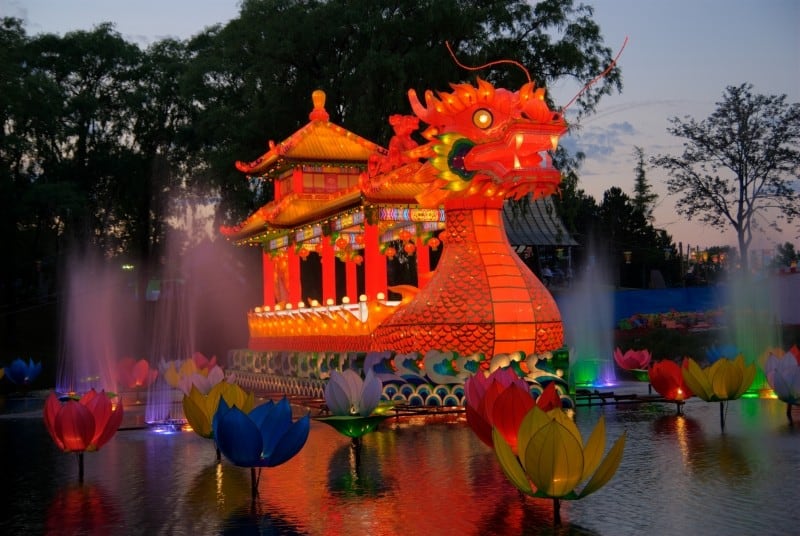Anyone with even a passing acquaintance to a Chinese family knows the heavy importance and emphasis the culture places on food and eating. “A Chinese mother shows her love of family through food,” says writer Harrison Cheung
, author of Christian Bale. Cheung recalls the first time he took the Oscar-winning actor and his father David (husband of American icon Gloria Steinem) to Dim Sum for the first time. As any Chinese host would, Cheung nodded for plate after plate of delicious Dim Sum, until their round, cloth-covered table was completely filled with Chinese delights to the edges. ‘Harrison!’ Cheung says, imitating David Bale’s deep voice and South African accent, ‘How can we possibly eat all of this food?’ But the trio did – and Cheung proceeded to order still more and the Bales went home with boxes of take-out. ‘It was gratifying,’ says Cheung, ‘to see Christian devour the dumplings and buns – eating each whole.’”
Image by: Catacami [flickr]
In the UK, one may have eaten at a local Chinese restaurant or gotten takeaway for the family. But neither options compare to the proverbial “real thing.” Without a doubt, taking China tours from UK
for this Chinese New Year/Spring Festival will guarantee you the finest cuisine for this celebratory time. Everything is awash in gold and red, symbolic colours of wealth and happiness.
Like numbers, food is symbolic to the Chinese (for more on this read The Joy Luck Club)/ Foods consumed during Spring Festival are similar daily food, but with an emphasis on s good-luck-to-come for the New Year.
Pot-stickers and dumplings are eaten three times a day, throughout the year. But during New Years’ celebrations, pot-stickers are reshaped to resemble gold and silver ingots to bring wealth for the New Year ahead. Peanuts bring longer life, and added to pot-stickers. Egg rolls are shaped similar to gold bars, so there’s a run on them during Spring Festival.
Noodles are closely aligned with the Chinese community and culture (4,000 years or more) and for New Years, noodles are made as long as possible, in order to ensure long life.
Leaves, too, signify longevity
. People eat leafy greens (served whole), like mustard and bok choy. Citrus fruits, too, are served whole, to bring wealth, luck and status. In the Chinese language Mandarin, words for citrus fruits sound like words for prosperity. The Mandarin word for “luck” sounds like tangerine, just as the word for “gold” sounds like orange and the words for “prosperity” and “status” sound like pomelo. Whole fruit is presented with stems and leaves, because they consider it ensures wholesome balance
Like the leaves and fruits, other edibles are cooked and served whole – fish, chicken, duck and crab. And don’t forget desserts (the Chinese rock sweet Dim Sum), which promises a sweet life in the New Year. Two foods that bring good luck, peanuts and sesame seeds provide the filling for sticky rice cakes. The lovely egg custard tarts feature flaky pastries and the layers of the pastries symbolize rising abundance in the next year. The tarts’ round shape represents family reunion, candied nuts and seeds celebrate fertility, while sugared lotus root brings luck.
Here’s quick cheat sheet of specially served foods for the Chinese New Year:
- Citrus fruits oranges, tangerines – symbolize wealth and luck. Serve them whole with stems and leaves, but never group in fours, a number which means death.
- Pomelos (similar to large grapefruits) = continuous prosperity and status
- Noodles are made as long as possible, as they represent long life.
- Leafy greens and long beans – serve whole to wish parents a long life.
- Whole fish = abundance
- Sweets = sweet life in the new year
- Kumquats = prosperity
- Coconut = togetherness
- Longans = sons
- Red Melon Seeds = happiness
- Nian Gao –steamed sweets of glutinous rice flour, brown sugar and oil; some have white sesame seeds, red dates or nuts
- Yuanbao (Jiaozi) – Northern China speciality Jiaozi are boiled doughy dumplings shaped like a silver ingot, filled with pork and cabbage, served with vinegar and soy sauce. For New Year, they’re called Yuanbao (ancient currency) and they bring prosperity
- Nuts = long life
- Dates = early prosperity
If spending Chinese New Years in China isn’t on your bucket list, it should be. The food prospects may be enticing enough!
